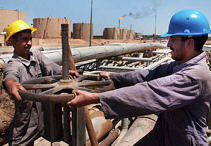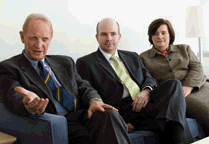
Typical street scene in Santa Ana, El Salvador. (Photo: iStock)
IMF Survey: IMF Helps Monitor Iraq Oil Money
March 10, 2008
- Monitoring and advisory board created to promote transparency, accountability in Iraq oil sector
- The absence of a metering system in Iraq made oil smuggling a problem
- IMF brought experience in the field to its work on the Board
Concerned about the lack of transparency and accountability in Iraq's oil industry, the United Nations Security Council established the International Monitoring and Advisory Board (IAMB) in 2003 to oversee the industry.

Iraqi oil workers adjust the flow of crude through pipes at the Daura oil refinery near Baghdad. (photo: Wathiq Khuzaie/ Getty)
OVERSEEING OIL REVENUES
The IAMB has made good progress under difficult conditions, although the job of ensuring that Iraq's oil revenues are used as intended is not yet finished.
Bert Keuppens and Chris Hemus, who represent the IMF on the IAMB, spoke to the IMF Survey online about their role and how they see things taking shape in Iraq. Keuppens is Director of the IMF's Office of Internal Audit and Inspection and Hemus is head of the Safeguards Assessments Division in the IMF's Finance Department.
IMF Survey: How much money is involved?
Keuppens: Well, quite a bit of money is involved. Since it started in May 2003, over $100 billion has been channeled into the Development Fund for Iraq. Most of this is from the export sales of crude oil. The DFI also received over $10 billion from the Oil-for-Food Program. Of course, the amount of money deposited in the DFI is heavily dependent on Iraq's oil production, which in 2007 was in the order of 2 million barrels, of which three-fourths are exported. This translates into sales in the order of $25-30 billion a year.
Creation of the IAMB
In 2003, the UN Security Council set up the Development Fund for Iraq (DFI). The DFI's purpose was to ensure that the proceeds of Iraq's oil export sales, the remaining balances from the UN Oil for Food Program, and other frozen Iraqi funds would be used for the benefit of the Iraqi people. The Security Council placed the DFI under the control of the Coalition Provisional Authority, in consultation with the Iraqi interim administration. Since June 2004, the Government of Iraq has administered the DFI.
The Council also called for the creation of an International Advisory and Monitoring Board (IAMB), whose job would be to promote transparency and financial accountability of the DFI. The IAMB comprises representatives of the United Nations, the Arab Fund for Economic and Social Development, the IMF, the World Bank, and, later, the Iraqi government.
By the end of 2008, the IAMB should be able to pass the baton to Iraq's Committee of Financial Experts, which appears to have the expertise and ability to take over the audit oversight role.
The bulk of this money is used for budgetary support in Iraq, meaning it's used to finance the government. It's channeled through the Ministry of Finance to the spending ministries. These ministries are subject to the oversight of the IAMB, since they are audited, and these audit reports are sent to us. Initially, $7½ billion of the DFI's funds were used to pay for contracts that were administered by the Coalition Provisional Authority, at that time headed by Ambassador [Paul] Bremer.
IMF Survey: Is the government of Iraq following up on the IAMB's recommendations?
Hemus: Very good progress has been made under very difficult circumstances. In 2004, the IAMB publicly expressed concerns about the absence of oil metering in the oil industry, as well as about the controls in place in the spending ministries. This was at the time of the Coalition Provisional Authority, and that body—the CPA—did take steps to curtail smuggling. And subsequent to that, the Iraqi government installed oil meters at the Basra oil terminal and has a project up and running to install metering systems countrywide.
Many of the IAMB's recommendations have been echoed by other audit bodies, notably the Government Accountability Office of the U.S. government and the Special Inspector General for Iraq Reconstruction. And the Iraqi government is taking steps to implement the recommendations that have come out of these various audits.
A very important step taken in 2006 was the establishment of the Committee of Financial Experts, an oversight body established by the Council of Ministers and chaired by the head of the Board of Supreme Audit in Iraq. They are responsible for following up on the recommendations of the IAMB and also, at this point, for working alongside the IAMB in continuing to oversee oil export revenues. The COFE, as it's known—this Committee of Financial Experts—has been active in monitoring controls of oil extraction and revenues, use of these revenues in the spending ministries, the installation of meters, and the monitoring of the status of the IAMB recommendations. What's important about this body is that its terms of reference provide it with a mandate whereby it can follow up—it reports to the Council of Ministers.
Against that background, we believe that very good progress has been made in addressing the concerns raised by the IAMB. It's not that challenges don't remain, but progress is being made, and the more important things are being actively addressed, notably the metering.
IMF Survey: What has the IAMB achieved since its creation?
Keuppens: As Chris mentioned, significant progress has been made in ensuring that the oil revenues are used for the benefit of the Iraqi people, which was the original and ultimate objective of this body. By making these reports available publicly, oil smuggling has been reduced. With oil metering, we have better control over what comes out of the ground. Ultimately, it's equally important to control what's supposed to go into the DFI and how it's used. We also ensured that there is more transparency and accountability in the ministries. Initially, it was difficult because we did not have access to some ministries or could not have audits done, but currently, all ministries are open to these audits. Some of them have reported significant weaknesses, which are being followed up by the Supreme Board of Audit.

From left: Bert Keuppens and Chris Hemus, IMF representatives on the IAMB, and Mary Hoare, of the IMF's Finance Department, which functions as the IAMB's secretariat.
How did we accomplish all this? The IMF built on its experience in this field—which it gained in the late 1990s in Russia and Ukraine, when there were allegations of misuse and misreporting by these countries. The IMF reacted by setting up its Financial Safeguards Assessments Program in the Finance Department, where assessments are done, to make sure that its resources are used as intended and that there's no misreporting. So we gained considerable experience working in central banks, doing these assessments. Of course, it's important that we are not alone. We work closely with the World Bank, the Arab Fund for Economic and Social Development, the UN, and the Iraqis.
We followed the same model for the IAMB in Iraq. We decided that it could function properly only if it were set up as an oversight body of the audit processes. But you can't just audit the whole country. You can ensure that proper mechanisms are in place for these things to be done, and this is precisely what the IAMB is doing.
For neither of us is this a full-time occupation. It's a by-product of the work we do, and it has grown out of the expertise we have gained. It's a collaborative effort with the Office of Internal Audit, with the [IMF] Finance Department functioning as the secretariat of the IAMB. We believe we were successful in building on the experience we gained in other countries.
IMF Survey: The IAMB's mandate has been extended several times, most recently until end-2008. What needs to happen in Iraq for the IAMB to hand over the reins?
Hemus: We on the IAMB have been working alongside the Committee of Financial Experts to ensure a smooth handover of responsibilities. We believe that COFE has the requisite mandate and the expertise to take over this audit oversight role. COFE, for example, has continued the transparency practice that was a very important element of IAMB from the beginning. They've established their own website; their reports are published on that website; and the results of the monitoring of previous audit recommendations are published on that website.
We will continue to work alongside COFE through the end of 2008, which is when the mandate of the IAMB is due to expire. At that point, we expect that COFE would be ready to take on this role. It's a large group of dedicated professionals who have demonstrated their experience, expertise, and ability to take over this role. Bert has had discussions with other stakeholders, such as the U.S. State Department about the timetable for when the IAMB could hand over this role, and we're optimistic—and have, in fact, been informed by the State Department—that this is likely to happen at the end of 2008.
IMF Survey: Has the IAMB encountered corruption and, if so, how has it addressed the problem?
Keuppens: The short answer is yes. Under the circumstances, one would expect that. The IAMB used the only tool we had available to promulgate our goal, which was full transparency. We have a website; all our reports are made available; we have press briefings; and many people, including in political fora, have looked at our reports. Our objective was to be able to report that all oil revenues were used for the benefit of the Iraqi people. Because of many shortcomings in a country that is torn apart by war, the IAMB has not been able to unilaterally declare that all oil revenues have been used for the benefit of the Iraqi people. You simply have no control over all oil revenues.
Significant progress was made, however, and we've seen a significant increase in accountability and in transparency in that field. But the truth is that these audits have also illustrated shortcomings in some contracting procedures that have also been reported by other authorities, including the U.S. Inspector General for Iraq Reconstruction and the Supreme Board of Audit, with whom we work. As a result, a number of people are being prosecuted and are in jail. But have we covered all cases? I don't think so, but we've made a significant dent in the process—increasing transparency and accountability for public funds.
IMF Survey: What are Iraq's prospects for economic recovery?
Keuppens: Well, we are not on the ground, and other people probably have a better idea about Iraq's prospects, but I can only report that our Iraqi colleagues who serve on this board—which is a courageous task; they serve sometimes at their personal peril—are much more optimistic now than they were when this initiative started. They say conditions in the country are better; it's safer to walk in the streets. To measure this with the traditional macroeconomic yardsticks, someone else would be better placed to answer that question (see related story: "Iraq Makes Progress on Economic Front").
Comments on this article should be sent to imfsurvey@imf.org


